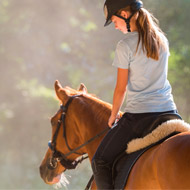Study confirms value of Ridden-Horse-Ethogram for detecting pain

There was no significant difference between real-time scores and video-based scores for the experienced assessor.
Veterinary professionals that have been trained to use a Ridden-Horse-Ethogram are better able to identify pain-related behaviour in horses, according to new research.
It is hoped that the finding, published in Equine Veterinary Education, will allow vets to better communicate performance-related problems more efficiently with their clients.
In the study, researchers compared the real-time application of the Ridden-Horse-Ethogram with analysis of video recordings of the horses.
The videos were then analysed by a trained assessor and determined if vets, who had been trained, could apply the ethogram in real time in a consistent way and in agreement with an experienced assessor.
Researchers found there was no significant difference between real-time scores and video-based scores for the experienced assessor, confirming the reliability of the system.
“The study confirms that with basic training veterinary observers can use the ridden horse ethogram with consistency as an effective tool to help identify musculoskeletal pain which could reflect lameness or back or sacroiliac pain,” said study leader Dr Sue Dyson, head of clinical orthopaedics at the Animal Health Trust.
“The volunteers were unanimously positive about the potential value of the ethogram in helping them to determine the presence of musculoskeletal pain in horses performing poorly or at pre-purchase examinations.”
Dr Dyson and her team are now working with the US evidence-based online learning resource, Equiptopia, to produce a training video to enable vets, owners, riders and trainers to learn how to apply to Ridden-Horse-Ethogram. To find out more email info@equitopiacenter.com



 The veterinary mental health charity Vetlife is inviting the veterinary community to join it for a sponsored cold-water dip.
The veterinary mental health charity Vetlife is inviting the veterinary community to join it for a sponsored cold-water dip.